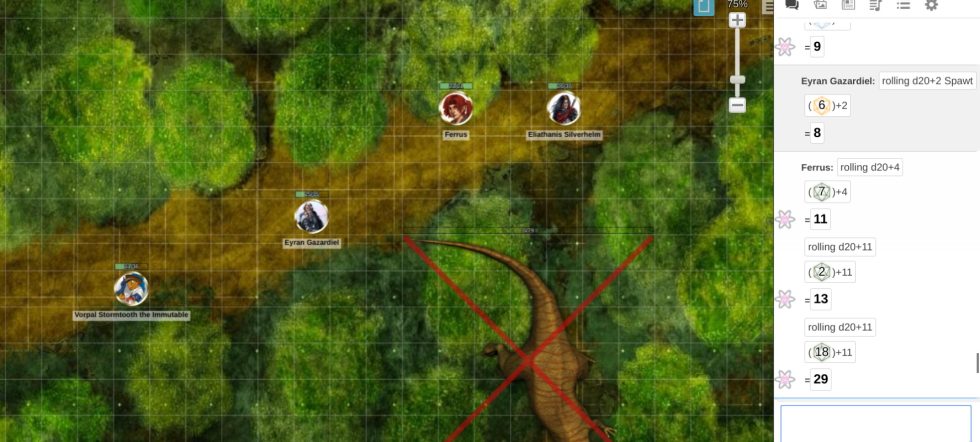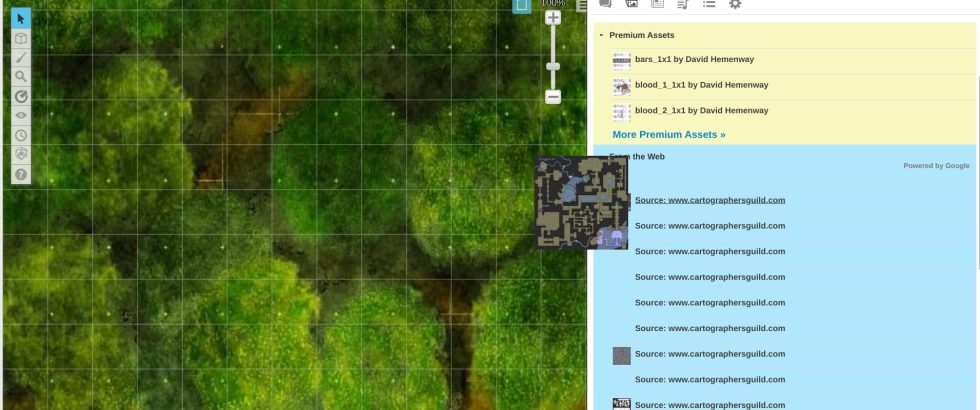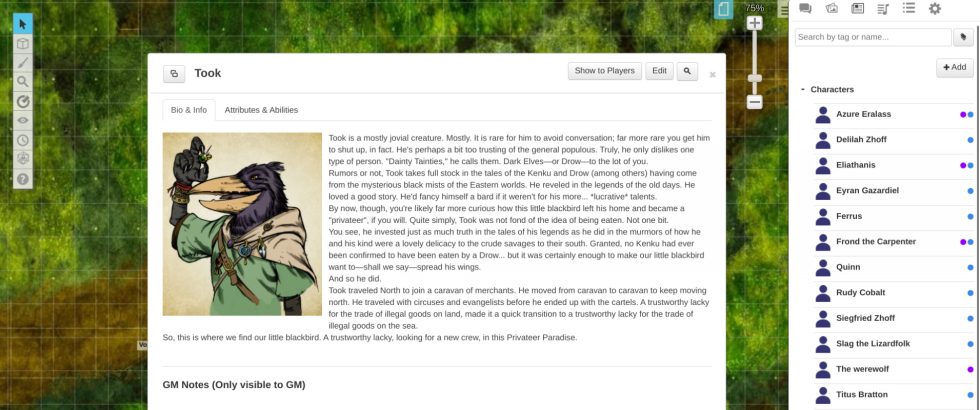When the dust cleared, the golem lay in pieces across the dungeon floor. Erik sighed deeply, and though his vision blurred, he could still see the rest of the party coming to his aid. Emmelina, the knight that had first welcomed him into the group, cradled him in her arms as he took his last breath. Our team had come this far only to lose its youngest member. Across five different states, there wasn't a dry eye among our team, but we recomposed ourselves and continued to play our tabletop adventure through the service weve used for half a decade now: Roll20.
Perhaps, like me, you had fun adventures with friends locally when you were younger or, perhaps you're interested in role-playing now but unable to actually, you know, meet up with anyone thanks to the pandemic. If so, Roll20 solves the biggest hurdle between you and delving dungeons with your buddies. And it does so without overly complicating things. If you have access to the internet, you can run virtual tabletop games of Dungeons & Dragons—or anything else—thanks to Roll20.

What is Roll20?
Roll20 is a digital platform from relatively small company The Orr Group. It launched in 2012 and allows people to create, share, and play tabletop campaigns. Various upgrades are available to purchase, but the basic service will let anyone do all of the above without too much muss or fuss. And of all the reasons to give Roll20 a shot, possibly the biggest is the simplest: its free.
From the start, Roll20 lets you create campaigns, use a variety of different maps which can be toggled as active or not, place digital miniatures in the form of tokens that can then be moved about said maps, and more. Want to do video and voice while you play? Thats built right in. Basic text chat also allows for rolling dice, sending messages as specific characters, and just, well, shooting the breeze. Theres even a jukebox function baked into the free version that lets you set the mood with a little music.
There are also certain premium options in Roll20, and they range from useful to extremely useful: things like dynamic lighting and premium tokens. But all of the core functionality is there from the start, and theres no reason to upgrade if you dont need the extras. Its a nice setup, really, because you can run full campaigns without having to pay anything, but all of the extras are helpful. The different subscription tiers (Plus at $49.99 a year and Pro at $99.99 a year) add more storage, the aforementioned dynamic lighting, custom character sheets, and more. Ive subscribed in the past and likely will again in the future, but for someone just starting out, a sub will likely only add more stuff to fiddle with. No need to up the learning curve from the start, after all.
In addition to subscription tiers, Roll20 also straight-up sells digital modules and handbooks to play a number of different RPG systems. If youre the kind of person that really wants to “wow” folks but doesnt have the time to build everything from scratch, you can just pick up some preconstructed adventures and run them without too much tweaking. In my opinion, nothing quite replaces having the physical books on hand, but theres also something to be said for being able to access anything and everything within said books using just a few clicks, and you cant exactly dump a physical book into a virtual tabletop system in the same way.

Who needs it?
Even before the COVID-19 response shut everything down, virtual tabletop was a way to connect with folks across disparate spaces—and it remains so. There just now happens to be even more people with the time and the distance to make such services all the more appealing. My own journey to Roll20 seems to be pretty common: in the wake of my high school Dungeons & Dragons group moving away for college, and then across the country for work, Roll20 let us play in the same space again, even if it was a digital one.
Since joining Roll20 in late 2012, Ive logged nearly 500 hours on the platform—with the vast majority of that bringing together friends and former acquaintances rather than random strangers. Not that theres any problem with random groups, and Roll20 even facilitates this with the ability to add yourself to a directory of players by indicating what sort of games, by system, youre looking to join. Or, if youre feeling adventurous, you can browse the forums where players look for games to join and where those running games look for players.
Over the years, Ive tried out other virtual tabletop platforms, but I always seem to drift back to Roll20 thanks to its relative ease of use and broad access. Other popular options include Fantasy Grounds or D20PRO, but both are far more fiddly than Roll20, in my experience. The path in Roll20 from signing up to joining a game to playing in a game is fairly straightforward, and for players, it largely comes across as seamless. Folks that are actually running games have a number of different choices to make, including just how detailed of a game they want to run, but players in large part simply need to click a couple links and show up at the designated time.
And that, for the last five years or so, has worked perfectly for a game that I run for a bunch of what were once acquaintances online. The vast majority of these are people Ive never physically met, and the one I have? The last time we met outside of the internet was something like 2013. Every two weeks, or three, we log into Roll20 in order to play out a campaign using Green Ronins Dragon Age tabletop setting. My players theorize in Discord about our game while were not playing, and they share terrible memes, and every session is a new reminder of just how much fun playing tabletop can be despite the fact that this is entirely virtual.
Heres an overview of the party: theres the jock knight that was kicked out of school, the archer that likes to play music and maybe has more religion in her than she cares to admit, the quiet elven mage that isnt always sure what to make of the rest of the group, and the dwarven gladiator trying to hold it all together. The archer keeps a canonical story-style log of our campaign, which at this point is hundreds of pages long. Theres fan art. And custom miniatures. And, at least partly, its all thanks to Roll20.

Best practices
Now, this isnt to say that everything about Roll20 is perfect. Like any other online service, it isnt always functioning at 100 percent, and it has its share of glitches and problems. By far the largest most consistent problem Ive encountered in my years with Roll20 has to do with video and voice chat. The number of times its frozen or failed to load entirely is beyond count—and thats not even taking into consideration the various other ways that video and voice chat has goofed up.
It can be extremely frustrating to deal witRead More – Source
[contf] [contfnew] 
arstechnica
[contfnewc] [contfnewc]






